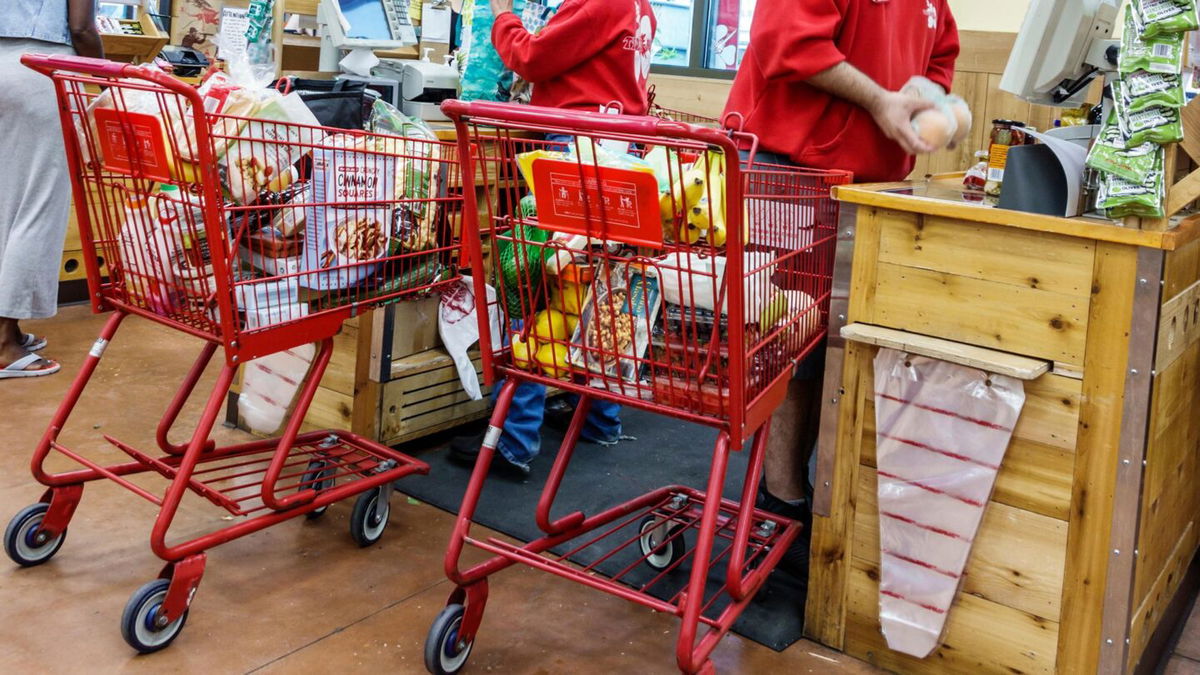Trader Joe’s says it’s not adding self-checkout lines to its stores

Trader Joe's says it’s not adding self-checkout lines to its stores. Pictured is Trader Joe's grocery store in Miami
By Jordan Valinsky, CNN Business
New York (CNN) — Self-checkout kiosks are invading several chains, like Target and Kroger. However, shoppers won’t see them at Trader Joe’s.
In a recent company released podcast, Trader Joe’s President Jon Basalone said a rumor that the quirky grocery chain was adding them was as “false as false can be.” He added: “We believe in people. We’re not trying to get rid of our crew members for efficiency’s sake.”
Basalone recalled a time when he had difficulty using a self-checkout kiosk and had to get an employee to help him. “I’m like, I do this for a living, and I can’t get this thing to work,” he said.
Fun at the checkout?
Trader Joe’s CEO Bryan Palbaum interjected in the conversation calling the automated kiosks “not fun” and said “self-checkout is work … I don’t want that.”
The duo also denied a rumor that their friendly cashiers are supposed to flirt with customers. “Definitively, no,” Palbaum said on the podcast.
Basalone said he understands how cashiers’ friendliness “might be misinterpreted” since the stores have garnered a “unique environment” where “everyone is genuinely interested in whether or not you are having a good day, compared to maybe perhaps other retailers.”
People hate self-checkout lines
Basalone and Palbaum are not alone either with their frustration with the kiosks, either.
According to a survey last year of 1,000 shoppers, 67% said they’d experienced a failure at the self-checkout lane. Errors at the kiosks are so common that they have even spawned dozens of memes and TikTok videos.
“We’re in 2022. One would expect the self-checkout experience to be flawless. We’re not there at all,” said Sylvain Charlebois, director of the Agri-Food Analytics Lab at Dalhousie University in Nova Scotia who has researched self-checkout, previously told CNN.
Even stores have difficulties with them because they’re expensive to install, often break down and can lead to customers purchasing fewer items. Stores also incur higher losses and more shoplifting at self-checkouts than at traditional checkout lanes with human cashiers.
They’re here to stay since chains are catering to shoppers who perceive self-checkout to be faster than traditional cashiers — despite little evidence to support that. However, since customers are doing the work, rather than waiting in line, the experience can feel like it’s moving more quickly (even if it’s not).
Ignoring the trends
Not jumping on the self-checkout trend isn’t the only thing that Trader Joe’s has ignored despite their competitors doing it. The privately held chain also doesn’t offer delivery, curbside pickup or robust e-commerce options for shopping.
Delivery is expensive for stores. Many supermarkets have outsourced the logistics to third-party platforms like Instacart rather than hire their own staff to handle orders. These platforms use a network of contract workers to select customers’ orders off store shelves and deliver them to their homes.
But Trader Joe’s stores are already overcrowded since the chain squeezes a limited number of items into small stores, many on city street corners. Additional people inside stores or cars in parking lots could make Trader Joe’s unbearable and adding curbside pickup would also be difficult to implement for these reasons.
Although Trader Joe’s could opt to build warehouses to fulfill grocery orders, that would be a huge investment for the company, which could force it to raise prices or cut pay.
“Creating an online shopping system for curbside pickup or the infrastructure for delivery — it’s a massive undertaking,” Trader Joe’s vice president of marketing Matt Sloan said in a company podcast in 2020. “It’s something that takes months or years to plan, build and implement and it requires tremendous resources.”
Trader Joe’s recently made headlines for a cookie recall because some cookies because might contain rocks.
The-CNN-Wire
™ & © 2023 Cable News Network, Inc., a Warner Bros. Discovery Company. All rights reserved.
CNN’s Nathaniel Meyersohn contributed to this report.